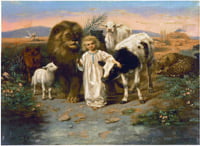The Scriptures point out two spiritual classes among the Lord’s people, one class of which will be kings and priests unto God and will be seated upon the throne of divine authority and power. This is a comparatively small class referred to as the “little flock,” the “very elect,” a “chosen generation,” a “royal priesthood,” the “bride” of Christ, the “church” and other titles. The other class is comparatively large, referred to as the “great multitude which no man can number,” and are represented as being before the throne, as servants and messengers (Revelation 7:9-15).
These two classes are referred to in the Parable of the Wise and Foolish Virgins. The first class, “the very elect,” have all their sins judged before the general judgment time for the world. They are “on trial” in this present time and have their sins atoned for and expiated. The other class, the “great multitude,” (“great company” in some Bible translations) are judged after the little flock, having “come up through great tribulation, and washed their robes, and made them white in the blood of the Lamb.”
The Apostle’s letter was addressed to Timothy, a child of God, and his instructions relate to the worldly ones outside of the church of Christ. Indeed, the world’s sins, both Adamic and willful, are all fully atoned for by the above two classes in association with the Lord Jesus Christ as the “sin offerings” of this great Atonement Day.
Additional Resources:
Christian Questions Podcast
Episode #1143: “What Does Jesus Expect From Us?”
Uncovering the age-lasting meaning of The Wise and Foolish Virgins
Preview Video
CQ Rewind Show Notes
3-part series “What Will We Be Doing When We Get to Heaven?”
(The “great multitude” is discussed in detail in Part III)









